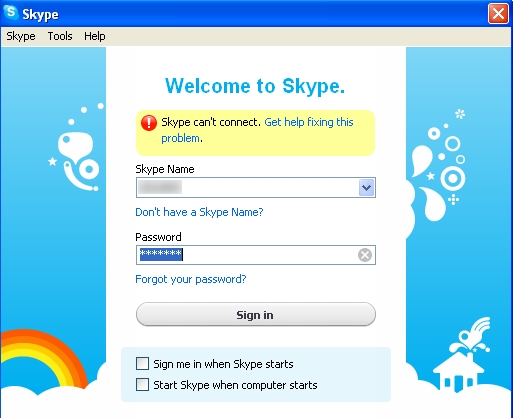Skype outage continues to affect enterprise users

Skype's enterprise users may still be suffering service outages after interruptions on Wednesday, according to the company.
The Skype downtime affected the internet telephony service across the globe from approximately 4:30pm GMT on Wednesday, and was caused by a software failure, according to the company.

The Skype downtime has caused sign-in problems for users. Screenshot: Shannon Doubleday
"An update on the downtime which has been affecting many of you around the world: the ability of one Skype user to find another relies on what we call 'supernodes', and yesterday, a number of these failed due to a software issue, which we've now identified," wrote Skype chief blogger Peter Parkes in a blog post on Thursday. "Our engineers are working to resolve the problem."
Some Skype users are classed as 'supernodes', or directory nodes — users who hold a record of the online presence of other users. Skype uses supernodes to route data and provide addressing details for individual Skype applications. If a Skype application wants to find out how to call another computer or phone it will sometimes turn to a supernode for the addressing information, according to Skype.
The company said that Skype Connect, its IP private branch exchange (PBX) product, was "working normally". However, business communications, once they leave the enterprise infrastructure, are routed through the same Skype peer-to-peer network of nodes as other Skype communications. In addtion, Skype Manager, which centrally manages Skype for businesses, was not operational at the time of writing.
"It's worth noting that our enterprise product, Skype Connect, is working normally, though Skype Manager and our other web-based functions will continue to stay offline for a little longer," Parkes said. "Additionally, features like group video calling will take longer to return to normal."
Enterprise customers may have problems signing into the system, the company said on Wednesday.
"Customers using the enterprise version of Skype for Windows may still experience delays signing in," the company wrote in a statement issued in English, German and Russian, late on Wednesday evening. The enterprise version of Skype for Windows is the Skype application that allows individual computers to make Skype calls.
"Thanks for your continued patience while we get everyone back online — sorry especially to those of you who are still waiting," Skype said in a post on Twitter at 6:23am on Thursday.
Skype's downtime affected millions of users across the world and, as of 11am on Thursday, Twitter users reported continued downtime across the network.
The company has published an FAQ page for users suffering downtime. The page contains suggestions for troubleshooting connectivity problems. One suggestion is to make modifications to the user's Windows firewall to make sure that the firewall allows exceptions. This action may make the machine elligible to become a supernode.
Computers cannot become a supernode if they are hosted on a network that is behind a "restrictive firewall", Skype says in a guide for universities wishing to prevent computers within their network becoming supernodes.
"Skype supernodes are chosen from nodes that have plenty of spare bandwidth, and are publicly reachable. This approach clearly favours the overall availability of the system," researchers from Cornell University and Google wrote in a 2006 study of the peer-to-peer network that underpins Skype.
"Skype uses spare network and computing resources of hundreds of thousands of supernodes, and little additional infrastructure to handle calls, as compared to traditional telephone companies and wireless carriers who rely on expensive, dedicated, circuit-switched infrastructure," the researchers wrote.